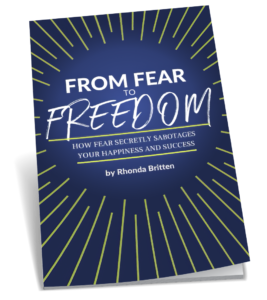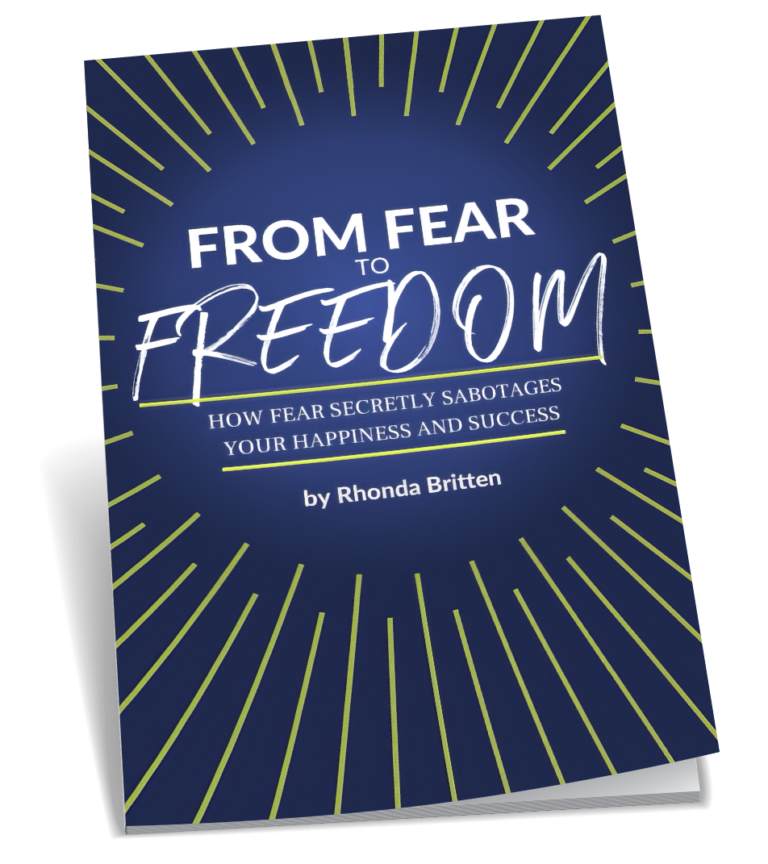Let’s talk about keeping secrets in a relationship. Can secrets hurt a relationship? Yes! Keeping secrets from the people you love can negatively impact your romantic relationships as well as your family, social, and personal relationships.
Many of my examples below will focus on romantic relationships since this is where secrets can cause the most damage, but all of the advice I give, and the principles of Fearless Living can be applied to any type of relationship. I’ve seen family secrets tear families apart, and I’ve seen friendships crumble because one side couldn’t be honest.
So, let’s dig into why people keep secrets and how they can harm your relationships.
Why Do People Keep Secrets in a Relationship?
People keep secrets because they fear being judged. Secret keeping in relationships is no different. Secrets in relationships typically happen either because one person is embarrassed about something, they don’t think their partner will understand, or they know they’ll face punishment over something they did that they know their partner won’t like. These things can be large or small.

For example, a small secret might be continuing to have a donut with your coffee on your way to work every morning even though you promised your partner you would cut back on the sweets. An example of a large secret would be pretending to be a mild-mannered accountant when you’re actually leading a double life as a secret agent.
Most of the time, the secrets people keep are more like the sneaking donuts example. You know your partner will be mad at you for eating donuts, but you like donuts, so you eat donuts when they’re not around. You do this both to spare their feelings and spare yourself the aggravation of having to listen to another lecture about the dangers of sugar. You keep your sugar habit a secret because it’s easier that way. What your partner doesn’t know won’t hurt them, right?
Keeping a secret from a loved one could also be to protect yourself. Let’s say, for example, you’re very close with your mother, but she’s homophobic, and you’re gay. You keep your sexual orientation a secret from her because you worry she will reject you if you’re honest about who you are.
While the specific secrets you keep from your loved ones will vary wildly from person to person, your need to keep the secret usually stems from the same thing: Fear.
If you’re afraid to be open and honest with the people or person you love most, your fear of being discovered will grow as the relationship continues. It's tough to keep secrets indefinitely, especially when they weigh heavily on our hearts, minds, and souls. Over time, this lack of mutual sharing and understanding will begin to harm the relationship, as more and more of it will be rooted in fear.
The Harm of Keeping Secrets in a Relationship
Now, you might be thinking, “Wait a minute. Is secrecy good in a relationship? What about keeping your own boundaries? What about privacy? Do I really have to tell the other person every single detail about my life?”
Don’t get me wrong; I’m not suggesting you overshare with every person you’re in a relationship with. Boundaries are super important.
Don’t get me started on the importance of boundaries! All healthy relationships have boundaries. But there’s a difference between privacy and secrecy.
Privacy maintains your boundaries, which makes it a basic need. Secrecy, on the other hand, occurs out of fear. You may not even realize it’s fear driving your need for secrecy, your need to lie. What’s triggering your choice to keep secrets or lie? What from your past might be connected to your secrecy? Why are you choosing to withhold? What are you worried about?
It’s critical to have boundaries and privacy, but that doesn’t mean you have to resort to secrecy.
It’s fear keeping you from opening up. You may be afraid of rejection, loss, not being good enough, etc., and that fear keeps you from being open and honest with the people you care about. While a few secrets here and there may not result in many consequences, these secrets will build over time, eroding trust; eventually, it could lead to a toxic relationship—one caused by your secrecy.
Here are a few examples of common secrets that can harm relationships:
- Lying about an addiction or vice, such as alcoholism, drug abuse, smoking, sex, or gambling.
- Having a secret relationship or sexual intimacy with another person without being honest about it with your partner.
- Not being honest about financial matters, paying bills, or debt you’re bringing into the relationship.
- Telling larger lies about aspects of your life, such as your job, vaccinations, STIs, or criminal records.
Many of these secrets are a deal breaker when it comes to relationships with your spouse, a new partner, family members, or close friends. Strong relationships are based on trust. This goes for any type of relationship.
The larger the secret, the more likely it is to harm a relationship.
Think about it from the other person’s point of view. How would you feel if you found out that your father was secretly married to another woman and you have other siblings, but no one in your family ever told you? How would you feel if you found out your best friend had a terminal illness they didn’t tell you about? How would you feel if you learned your partner smokes a pack of cigarettes every day after they told you they quit?
It hurts when people you care about, and who you believe care about you, keep secrets from you or outright lie to you. So how do you think your own secrecy affects the people you love? You’re so afraid of looking bad, addressing conflict, or losing the relationship that you hold back. But, ironically, it could be your very secrecy that leads to the end of the relationship.
Keeping secrets may even be an intentional or unintentional power move for you. It makes you feel big; you’re better than the other person because you know something they don’t. But your continued secrecy is doing far more harm than good to yourself.
How to Open Up and Move Beyond Your Fear

Examine your current relationship or relationships. Are you a secret keeper? Take a step back and try to understand why you want to keep secrets. What is triggering this need? I can tell you here and now that fear is guiding your decision or subconscious desire to keep secrets.
Did someone hurt you in the past?
Have your past toxic relationships taught you that it’s okay to tell lies in a relationship?
Do you worry about what other people would think if they knew the truth? Do you feel like people wouldn’t actually like you if they knew the full, REAL you? Do you worry your loved ones will reject you if you are open and honest?
Is it fear of rejection? Fear of not being good enough? If you are open about your past, maybe your partner will leave you. If you tell your friend about your mistake, maybe they won’t be able to forgive you. Maybe they will leave your life forever. Cue your fear of loneliness. If you express how you feel, your partner might see you as weak. Showing vulnerability means risking getting hurt.
In order to build a healthy relationship, start by approaching the situation as openly and honestly as possible. Find ways to talk about your feelings and concerns with your partner.
Remember, they are your loved ones because they care about you. Why would their first reaction be to judge or criticize you—they love you!
Remember why you are in the relationship in the first place. Do you trust the other person?
If you truly trust the other person, then do more of that—TRUST.
When someone you care about opens up and tells you something important, do you criticize them and laugh in their face for being vulnerable? No. So why do you expect this from your loved ones? Have they given you any indication they would act in this way? (If they have, this is another issue entirely, and you may need to figure out whether or not you’re in a toxic relationship.)
If you do suspect you’re in a toxic or one-sided relationship, you have a different task ahead of you. Figure out if you can salvage the toxic relationship or begin to take steps to move on. Toxic relationships are bad for your physical health, mental health, and emotional health, and it’s fear that’s keeping you from breaking free.
In any healthy relationship, it's also important to set clear boundaries around what kinds of secrets are okay to keep from your partner and which ones aren't. For instance, you might choose not to share details about your past or specific financial matters (that don’t affect them) while still being open and honest about your needs, daily life, career, and dreams for the future.
Boundaries are incredibly important, and you can have clear boundaries as well as privacy without keeping secrets.
Be clear about what your boundaries are and the consequences of breaking those boundaries while also remembering your partner is a human being who has boundaries too. There’s a good chance that being lied to over and over again crosses at least one of their boundaries.
Remember that you and your partner are a team, and no matter what challenges or disagreements you face, you’ll face them together.
If you are in a trusting relationship, there’s no reason to keep unnecessary secrets or lie to your partner, friend, family member, etc. But of course, for many of us, that’s easier said than done because fear is in the driver's seat.
Building Strong Relationships
If you find you continually keep secrets from the people you care about, you likely have deep-rooted emotional fear that’s holding you back.
The Fearless Living community is full of humans just like you who are seeking to build honest, strong relationships and live a life free from fear. The Fearless You membership is an all-encompassing toolkit to master fear and build unshakable confidence. The membership gives you access to ALL of my premium courses, live sessions, and time every month with myself and my coaches.
All of my Fearless Living courses use neuroscience breakthroughs to help you create real, lasting change. These are courses that have been proven over 25 years, with tens of thousands of students! And most importantly, you’ll be part of a caring community that will help you find your way through the fear, toxic relationships, and other baggage that’s keeping you from being the best version of yourself.
With Fearless Living, you’ll learn how to set clear boundaries, open up to loved ones, and reach your full potential. Catapult your confidence and begin living the life your soul intended™ within 30 days through Fearless You. Don’t wait. Your relationships depend on it!
Whether or not you’re ready to take the leap into Fearless You, you can always access my library of resources on the Fearless Living blog. These free resources don’t dig as deep as the coursework on Fearless You, but they’re a great place to start, and these guides complement the content on Fearless You if you’re already a member.
Next up, I recommend you read (and reread whenever you’re feeling stuck!) the following Fearless Living guides:
Let’s talk about keeping secrets in a relationship. Can secrets hurt a relationship? Yes! Keeping secrets from the people you love can negatively impact your romantic relationships as well as your family, social, and personal relationships.
Many of my examples below will focus on romantic relationships since this is where secrets can cause the most damage, but all of the advice I give, and the principles of Fearless Living can be applied to any type of relationship. I’ve seen family secrets tear families apart, and I’ve seen friendships crumble because one side couldn’t be honest.
So, let’s dig into why people keep secrets and how they can harm your relationships.
Why Do People Keep Secrets in a Relationship?
People keep secrets because they fear being judged. Secret keeping in relationships is no different. Secrets in relationships typically happen either because one person is embarrassed about something, they don’t think their partner will understand, or they know they’ll face punishment over something they did that they know their partner won’t like. These things can be large or small.

For example, a small secret might be continuing to have a donut with your coffee on your way to work every morning even though you promised your partner you would cut back on the sweets. An example of a large secret would be pretending to be a mild-mannered accountant when you’re actually leading a double life as a secret agent.
Most of the time, the secrets people keep are more like the sneaking donuts example. You know your partner will be mad at you for eating donuts, but you like donuts, so you eat donuts when they’re not around. You do this both to spare their feelings and spare yourself the aggravation of having to listen to another lecture about the dangers of sugar. You keep your sugar habit a secret because it’s easier that way. What your partner doesn’t know won’t hurt them, right?
Keeping a secret from a loved one could also be to protect yourself. Let’s say, for example, you’re very close with your mother, but she’s homophobic, and you’re gay. You keep your sexual orientation a secret from her because you worry she will reject you if you’re honest about who you are.
While the specific secrets you keep from your loved ones will vary wildly from person to person, your need to keep the secret usually stems from the same thing: Fear.
If you’re afraid to be open and honest with the people or person you love most, your fear of being discovered will grow as the relationship continues. It's tough to keep secrets indefinitely, especially when they weigh heavily on our hearts, minds, and souls. Over time, this lack of mutual sharing and understanding will begin to harm the relationship, as more and more of it will be rooted in fear.
The Harm of Keeping Secrets in a Relationship
Now, you might be thinking, “Wait a minute. Is secrecy good in a relationship? What about keeping your own boundaries? What about privacy? Do I really have to tell the other person every single detail about my life?”
Don’t get me wrong; I’m not suggesting you overshare with every person you’re in a relationship with. Boundaries are super important.
Don’t get me started on the importance of boundaries! All healthy relationships have boundaries. But there’s a difference between privacy and secrecy.
Privacy maintains your boundaries, which makes it a basic need. Secrecy, on the other hand, occurs out of fear. You may not even realize it’s fear driving your need for secrecy, your need to lie. What’s triggering your choice to keep secrets or lie? What from your past might be connected to your secrecy? Why are you choosing to withhold? What are you worried about?
It’s critical to have boundaries and privacy, but that doesn’t mean you have to resort to secrecy.
It’s fear keeping you from opening up. You may be afraid of rejection, loss, not being good enough, etc., and that fear keeps you from being open and honest with the people you care about. While a few secrets here and there may not result in many consequences, these secrets will build over time, eroding trust; eventually, it could lead to a toxic relationship—one caused by your secrecy.
Here are a few examples of common secrets that can harm relationships:
- Lying about an addiction or vice, such as alcoholism, drug abuse, smoking, sex, or gambling.
- Having a secret relationship or sexual intimacy with another person without being honest about it with your partner.
- Not being honest about financial matters, paying bills, or debt you’re bringing into the relationship.
- Telling larger lies about aspects of your life, such as your job, vaccinations, STIs, or criminal records.
Many of these secrets are a deal breaker when it comes to relationships with your spouse, a new partner, family members, or close friends. Strong relationships are based on trust. This goes for any type of relationship.
The larger the secret, the more likely it is to harm a relationship.
Think about it from the other person’s point of view. How would you feel if you found out that your father was secretly married to another woman and you have other siblings, but no one in your family ever told you? How would you feel if you found out your best friend had a terminal illness they didn’t tell you about? How would you feel if you learned your partner smokes a pack of cigarettes every day after they told you they quit?
It hurts when people you care about, and who you believe care about you, keep secrets from you or outright lie to you. So how do you think your own secrecy affects the people you love? You’re so afraid of looking bad, addressing conflict, or losing the relationship that you hold back. But, ironically, it could be your very secrecy that leads to the end of the relationship.
Keeping secrets may even be an intentional or unintentional power move for you. It makes you feel big; you’re better than the other person because you know something they don’t. But your continued secrecy is doing far more harm than good to yourself.
How to Open Up and Move Beyond Your Fear

Examine your current relationship or relationships. Are you a secret keeper? Take a step back and try to understand why you want to keep secrets. What is triggering this need? I can tell you here and now that fear is guiding your decision or subconscious desire to keep secrets.
Did someone hurt you in the past?
Have your past toxic relationships taught you that it’s okay to tell lies in a relationship?
Do you worry about what other people would think if they knew the truth? Do you feel like people wouldn’t actually like you if they knew the full, REAL you? Do you worry your loved ones will reject you if you are open and honest?
Is it fear of rejection? Fear of not being good enough? If you are open about your past, maybe your partner will leave you. If you tell your friend about your mistake, maybe they won’t be able to forgive you. Maybe they will leave your life forever. Cue your fear of loneliness. If you express how you feel, your partner might see you as weak. Showing vulnerability means risking getting hurt.
In order to build a healthy relationship, start by approaching the situation as openly and honestly as possible. Find ways to talk about your feelings and concerns with your partner.
Remember, they are your loved ones because they care about you. Why would their first reaction be to judge or criticize you—they love you!
Remember why you are in the relationship in the first place. Do you trust the other person?
If you truly trust the other person, then do more of that—TRUST.
When someone you care about opens up and tells you something important, do you criticize them and laugh in their face for being vulnerable? No. So why do you expect this from your loved ones? Have they given you any indication they would act in this way? (If they have, this is another issue entirely, and you may need to figure out whether or not you’re in a toxic relationship.)
If you do suspect you’re in a toxic or one-sided relationship, you have a different task ahead of you. Figure out if you can salvage the toxic relationship or begin to take steps to move on. Toxic relationships are bad for your physical health, mental health, and emotional health, and it’s fear that’s keeping you from breaking free.
In any healthy relationship, it's also important to set clear boundaries around what kinds of secrets are okay to keep from your partner and which ones aren't. For instance, you might choose not to share details about your past or specific financial matters (that don’t affect them) while still being open and honest about your needs, daily life, career, and dreams for the future.
Boundaries are incredibly important, and you can have clear boundaries as well as privacy without keeping secrets.
Be clear about what your boundaries are and the consequences of breaking those boundaries while also remembering your partner is a human being who has boundaries too. There’s a good chance that being lied to over and over again crosses at least one of their boundaries.
Remember that you and your partner are a team, and no matter what challenges or disagreements you face, you’ll face them together.
If you are in a trusting relationship, there’s no reason to keep unnecessary secrets or lie to your partner, friend, family member, etc. But of course, for many of us, that’s easier said than done because fear is in the driver's seat.
Building Strong Relationships
If you find you continually keep secrets from the people you care about, you likely have deep-rooted emotional fear that’s holding you back.
The Fearless Living community is full of humans just like you who are seeking to build honest, strong relationships and live a life free from fear. The Fearless You membership is an all-encompassing toolkit to master fear and build unshakable confidence. The membership gives you access to ALL of my premium courses, live sessions, and time every month with myself and my coaches.
All of my Fearless Living courses use neuroscience breakthroughs to help you create real, lasting change. These are courses that have been proven over 25 years, with tens of thousands of students! And most importantly, you’ll be part of a caring community that will help you find your way through the fear, toxic relationships, and other baggage that’s keeping you from being the best version of yourself.
With Fearless Living, you’ll learn how to set clear boundaries, open up to loved ones, and reach your full potential. Catapult your confidence and begin living the life your soul intended™ within 30 days through Fearless You. Don’t wait. Your relationships depend on it!
Whether or not you’re ready to take the leap into Fearless You, you can always access my library of resources on the Fearless Living blog. These free resources don’t dig as deep as the coursework on Fearless You, but they’re a great place to start, and these guides complement the content on Fearless You if you’re already a member.
Next up, I recommend you read (and reread whenever you’re feeling stuck!) the following Fearless Living guides:







